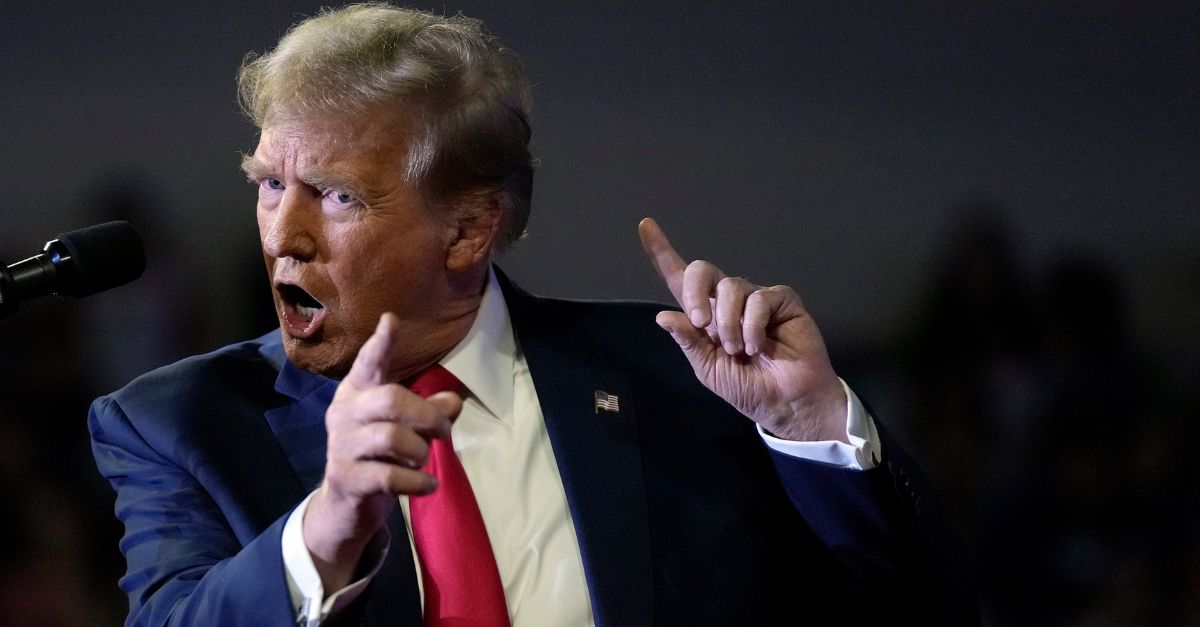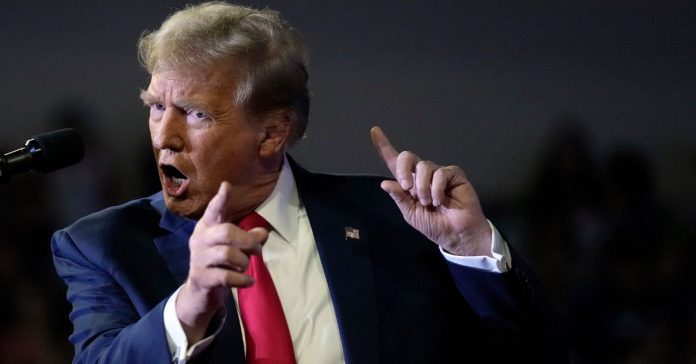
Republican presidential candidate former President Donald Trump speaks at a Get Out The Vote rally at Coastal Carolina University in Conway, S.C., Saturday, Feb. 10, 2024. (AP Photo/Manuel Balce Ceneta)
Breath is bated among special counsel prosecutors and defense attorneys on Donald Trump‘s roster alike this week as the parties await a significant decision from the U.S. Supreme Court: Will the justices agree to delay Trump’s election subversion trial while he appeals the question of his immunity from criminal prosecution?
“It’s a 60-40 chance that they do answer it,” Brookings Institute senior fellow and legal analyst Norm Eisen said in a phone interview with Law&Crime on Friday. “They shouldn’t grant cert. They should today treat the filings that have been made as a petition for certiorari and summarily deny it.”
He cautioned, however, the justices on the high court “may not be able to resist” wading into the debate.
But even if they do decide to take up the question, triggering a new flurry of legal filings and splitting the attention of some of Trump’s lawyers yet again — some on his defense team in Washington also represent him in other venues where he faces indictment — Eisen is confident it will not spell doom for the prospects of the election subversion trial now on hold. It was originally slated for March 4.
“It doesn’t necessarily throw things out of whack because Manhattan District Attorney Alvin Bragg’s 2016 election interference and hush money case [against Trump] is set for March 25 … that will occupy April and May and if the Supreme Court moves at a reasonably abbreviated timetable, then they will be able to dispose of the case and get [the election subversion trial] back on the docket for this summer,” Eisen said, recalling that the presiding judge in the matter in Washington, D.C., U.S. District Judge Tanya Chutkan, has already forecast that the parties will need just 90 days to deal with pretrial motions.
If the Supreme Court does go to the trouble of answering Trump’s question, Eisen said he is confident they court will reject the premise.
“There is no absolute immunity in American law. It’s a pure delay game that Trump is endeavoring. That’s really all it is and I think there are sufficient votes up there to interdict that,” he said.
Eisen said he imagines oral arguments would be a “fiasco” for Trump, just like it was when his attorneys tried their luck with the appellate panel and found themselves unanimously rejected. It could potentially be a devastating blow.
“The evidence is very negative for him. He’s got a bad judge from his perspective — which is what everybody else would call a good judge — a jury pool that is not going to be well disposed to him. So you can understand why he has put such a desperate effort into this immunity event. Its really only a question of whether he can do a bank shot: delay this trial, win the election and then order the case dismissed or pardon himself. That’s his only hope,” Eisen said.
Law&Crime takes a look at those developments and others in Trump’s cases in Florida, Georgia, Washington, D.C., and New York.
NEW YORK
CIVIL
New York State Supreme Court Justice Arthur Engoron ruled on Feb. 16 that Trump must pay a staggering $355 million after he was found to have fraudulently inflated his net worth, slamming him and others at Trump Organization for “their complete lack of contrition and remorse [that] borders on pathological.”
Prosecutors led by State Attorney General Letitia James initially asked for a lifetime ban on Trump from the real estate industry but Engoron only ordered that Trump be banned from serving in a leadership position from any New York corporation for 3 years.
Importantly, Engoron also nixed his decision from last year where he ordered Trump’s New York companies dissolved because he appointed a monitor to oversee Trump’s business dealings.
The ruling comes just a few weeks after Trump was ordered to pay an additional $83.3 million to writer E. Jean Carroll for defamatory statements he made about her while denying that he raped her over a decade ago.
CRIMINAL
It’s official: For the first time in U.S. history, a former president will go on trial to face criminal charges.
This week in an order from the bench, New York State Supreme Court Justice Juan Merchan denied Trump’s motion to dismiss his criminal indictment for allegedly falsifying hush-money payments to adult film star Stormy Daniels ahead of the 2016 election and locked in the trial date of March 25.
Merchan was pointed with Trump and his lawyers this week, snapping at Trump’s attorney Todd Blanche: “You don’t have a trial date in Georgia. You don’t have a trial date in Florida.”
WASHINGTON, D.C.
CRIMINAL and CONSTITUTIONAL
Trump’s federal docket in the nation’s capital where he faces multiple charges accusing him of criminally conspiring to overturn the results of the 2020 election has stayed quiet as things remain in flux over the immunity question at the U.S. Supreme Court.
The Supreme Court docket was awash in activity.
Unsurprisingly, special counsel Jack Smith vehemently opposed Trump’s motions this week, arguing the former president’s claims of prosecutorial partisanship and excessive discovery review demands are little more than attempts at delaying the inevitable.
Trump meanwhile cast Smith as making “misrepresentations” to the court.
When it wasn’t Smith or Trump trading sharply-worded motions, it was a bevy of constitutional law scholars and professors stirring up activity. An amicus brief was filed with the high court early this week urging justices to affirm that their findings that Trump’s “total” immunity claim “reflects a misreading of constitutional text and history as well as this Court’s precedent.”
A decision on whether Trump will be disqualified from the Colorado ballot for the state’s presidential primary under the Constitution’s insurrection clause was not issued this week.
The group representing voters that brought that lawsuit, Citizens for Responsibility and Ethics in Washington, released a report this week that they say bolsters their case: More than 200 Jan. 6 defendants said they came to the Capitol explicitly because Trump told them to do so.
GEORGIA
CRIMINAL
In Fulton County, Georgia where Trump faces criminal racketeering and forgery charges pertaining to his alleged attempt to overturn his 2020 electoral loss in the state, it was all fireworks when District Attorney Fani Willis took the stand for one day to testify about allegations that she and special prosecutor Nathan Wade had an improper relationship.
She was not expected to testify but abruptly reversed course.
This week, Wade told the court their relationship “wasn’t a secret.” A former friend of Willis testified too, saying Willis’ relationship with Wade began years before they first claimed.
Willis sharply rejected any claims of impropriety, telling the court it was “highly offensive when someone lies on you.“
FLORIDA
CRIMINAL
U.S. District Judge Aileen Cannon rejected a demand from Trump’s lawyers to delay his pretrial deadlines in the classified documents case where Trump faces dozens of criminal charges.
The deadline for pretrial motions remains fixed at Feb. 22.
Prosecutors were very likely delighted: Smith filed a thundering motion to the court on Feb. 9, tearing into Cannon for “clear error” in her rulings around restrictions over documents in evidence.
Though last July Cannon set a trial date of May 20 for the case, there’s still a chance that won’t happen as Trump’s lawyers have been angling in every venue to slow walk proceedings.
Have a tip we should know? [email protected]

